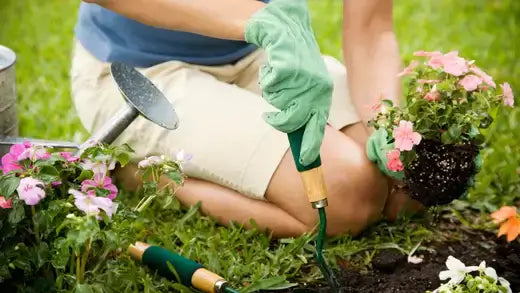The Basics Of Gardening for Beginners
Gardening is a rewarding and fulfilling activity that allows individuals to connect with nature, cultivate plants, and create beautiful outdoor spaces. Whether you have a spacious backyard or just a tiny balcony, gardening offers a wide range of benefits, from providing fresh produce to promoting mental well-being. If you're new to gardening, this comprehensive guide will walk you through the basics, from selecting the right plants to nurturing them to thrive.
Understanding Your Space for beginners
Before diving into sunlight exposure gardening, take time to understand your available space. Consider factors like sunlight exposure, soil type, and climate. This information will help you choose the right plants to flourish in your environment.
a. Sunlight: Different plants have varying light requirements. Some thrive in full sunlight, while others prefer partial or complete shade. Observe your space throughout the day to determine the amount of sun it receives and match your plant choices accordingly.
b. Soil Type: Understanding your soil type is crucial for plant growth. Soil can be sandy, loamy, or clayey, each with drainage and nutrient-holding characteristics. To improve quality, you would amend the soil with compost or other organic matter.
c. Climate: Your climate zone plays a significant role in the types of plants that will do well in your garden. The U.S.D.A. Plant Hardiness Zone Map can help you identify your specific climate zone and guide your plant choices.
Choosing the Right Plants for biginners
Selecting the right plants for your garden is essential for success. As a beginner, opt for plants that are relatively easy to care for and suited to your environment. Here are a few plant categories to consider:
a. Native Plants: Native plants are well adapted to the local climate and require more minor maintenance. They also support local wildlife and pollinators.
b. Perennials: Perennial plants come back year after year, saving you the effort of replanting annually.
c. Herbs and Vegetables: Growing your herbs and vegetables is rewarding and cost-effective. Tomatoes, peppers, basil, and mint are excellent choices for beginners.
d. Container Plants: Container gardening is a fantastic option if you have limited space. You can grow various plants in pots on a balcony, patio, or windowsill.
Preparing Your Garden
Once you've selected your plants, it's time to prepare your garden space. Follow these steps to create a suitable environment for your plants to thrive:
a. Clear the Area: Remove any weeds, debris, or rocks from the chosen area. This will prevent competition for nutrients and space.
b. Amend the Soil: Test your soil's pH and nutrient levels. Add compost, peat moss, or other organic stuff to improve soil structure and fertility.
c. Mulching: Applying a layer of mulch around your plants helps retain moisture, suppress weeds, and regulate soil temperature.
Planting
Proper planting techniques are essential for donating your plants a strong start. Follow these steps to plant your chosen vegetation:
a. Digging Holes: Dig holes slightly larger than your plants' root balls. This gives the roots room to spread and establish themselves.
b. Watering: Before planting, thoroughly water the plants. After placing them in the holes, water them again to help settle the soil around the roots.
c. Spacing: Follow the recommended spacing guidelines for each plant. Proper spacing prevents overcrowding, leading to poor air circulation and disease.
Watering and Maintenance
Regular maintenance is crucial to the health of your garden. Watering, pruning, and monitoring for pests are essential tasks to master:
a. Watering: Different plants have different water needs. Generally, watering deeply and less frequently than shallowly and often is better. Early morning is the best time to water, as it reduces evaporation and allows leaves to dry before nighttime.
b. Pruning: Regular pruning promotes healthy growth and prevents overcrowding. Remove dead or diseased branches, spent flowers, and excess growth.
c. Pest Management: Watch for pests like aphids, caterpillars, and snails. Early detection and appropriate action, such as organic pest control, can prevent infestations.
Fertilizing
Plants require nutrients to thrive, and fertilizers help supplement the soil's nutrient content. There are two main types of fertilizers: organic and synthetic. Organic fertilizers are derived from natural sources, while synthetic fertilizers are chemically formulated. Consider using organic fertilizers for a more sustainable approach to gardening.
Seasonal Considerations
Gardening is a year-round endeavor, and each season brings different tasks and challenges:
a. Spring: This is a busy time for planting and sowing seeds. It's also the season for cleaning up any winter debris.
b. Summer: Regular watering and monitoring for pests are essential during the hot summer months. Mulch helps retain moisture and regulate soil temperature.
c. Fall: Fall is an excellent time for planting perennials and bulbs. It's also a time to clean up spent plants and prepare your garden for winter.
d. Winter: Depending on your climate, winter might be a time of rest for your garden. Consider planting cold-hardy vegetables or focusing on indoor plants.
Patience and Observation
Gardening requires patience. Plants take time to grow and flourish. Observe your garden regularly, noting any growth, color, or health changes. This will help you identify and address issues promptly.
Conclusion
Embarking on a beginner's gardening journey can be exciting and educational. By understanding your space, selecting appropriate plants, preparing your garden, and consistently tending to your plant's needs, you'll be well on your way to creating a thriving garden. Remember that gardening is a learning process, and each season will bring new lessons and experiences. With dedication, patience, and a love for nature, your garden will undoubtedly flourish and bring you joy for years to come.




